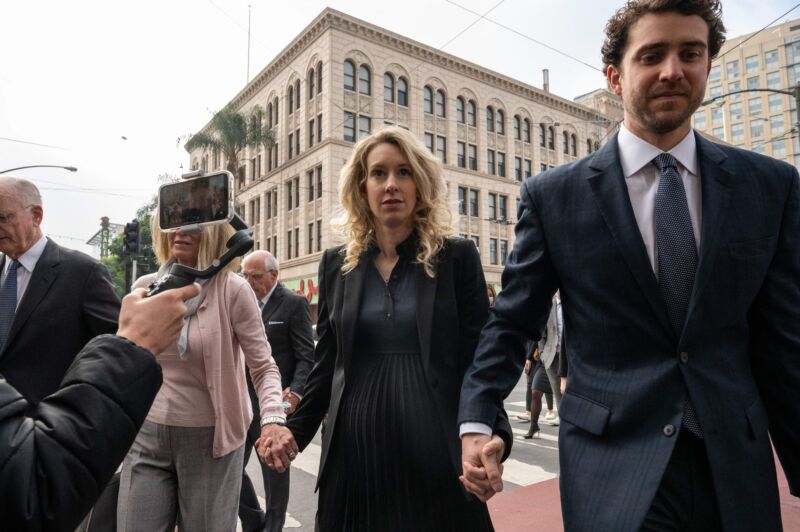
Convicted fraudster Elizabeth Holmes had a rough Tuesday.
The judge in her fraud case, U.S. District Judge Edward Davila, ordered her and her ex-boyfriend, Ramesh “Sunny” Balwani, to pay $452 million in restitution to defrauded investors of their infamous and now-defunct blood testing company, Theranos. Holmes, the company’s founder and former CEO, and Balwani, the former president, are jointly responsible for paying back the hefty sum.
Meanwhile, a three-judge panel of the U.S. Court of Appeals for the 9th Circuit denied Holmes’ last-ditch effort to stay out of jail as she appeals her conviction. Last month, Holmes challenged Davila’s previous bail denial and asked the 9th Circuit appeals court to weigh in. The move caused an automatic delay to the start of her 11-year, three-month prison sentence, while the appeals court reviewed her argument. Davila had previously ordered her to report to prison on April 27.
While her latest attempt earned her a few extra weeks of freedom, the appeals court unsurprisingly denied her bail. In a one-page order on Tuesday, the judges concluded that Holmes’ appeal did not raise a “substantial legal or factual question” in her case, nor would it overturn her conviction or warrant a new trial if the court sided with her. The appeal against her conviction will go ahead as previously planned, and it fell to Davila to set a new date for Holmes to report to prison.
In Wednesday’s filings, Holmes asked her new prison start date to be May 30, giving her time to get her act together, including setting up daycare for her two young children. Davila agreed.
Balwani, who was convicted of all 12 counts of defrauding Theranos investors and patients, began serving nearly 13 years in prison last month. Balwani is also appealing his conviction and had tried to remain free on bail during the trial.
Rise and fall
While at the helm of Theranos, Holmes and Balwani claimed their patented blood testing device could accurately perform hundreds of medical tests with just a tiny drop of blood from a fingerstick. Holmes became a superstar in Silicon Valley, receiving critical acclaim as he courted high-stakes investors. In 2015, the company was valued at $9 billion, and Forbes listed Holmes as the richest self-made woman, with an estimated net worth of $4.5 billion.
But in 2018, federal prosecutors accused the duo of plotting to trick investors into funding their tech startup, which never really worked. As Davila summed it up, the government alleged that between 2010 and 2015, the two “made false statements about the capabilities of Theranos’ proprietary analyzer, its financial revenue streams and device demonstrations, as well as misrepresentations of Theranos’ relationships and interactions with Walgreens, the U.S. Department of Defense, the Food and Drug Administration, pharmaceutical companies and research institutions.”
Once the company went live, federal prosecutors allege the pair continued to defraud doctors and patients between 2013 and 2016. This would include “delivering marketing materials to physicians and patients related to Theranos blood tests, posting misrepresentations on Theranos websites, and sending blood test results with inaccuracies and alterations.”
In January 2022, Holmes was convicted of four charges related to defrauding investors, and Balwani was convicted last July of defrauding investors, doctors and patients.
In Davila’s order on Tuesday, he calculated that Balwani and Holmes owe a $452 million restitution. That includes paying back $397,547,268 to individual investors, including Rupert Murdoch, who invested the largest amount of $124,999,997. It also includes paying back $14.5 million to Safeway and $40 million to Walgreens, which partnered with Theranos to offer blood testing at the drugstore giant’s convenience stores. Davila noted that when Walgreens asked for due diligence documents on the technology, Holmes sent the pharmacy chain forged validation documents with Pfizer’s logo — though Pfizer never endorsed Theranos’ technology and was skeptical about it and stopped investing in the company.
It’s unclear how Balwani and Holmes will split the bill. According to court documents, Holmes has only modest assets that are outweighed by a $450,000 loan to pay for a settlement with the Securities and Exchange Commission. She also accrued more than $30 million in legal fees.

